I have been getting questions, so I thought I would take the time to answer them here.
What Do We Do For School?
Stephanie, our younger children are using Spectrum this year. I like the thoroughness of the worksheets, the attractiveness of the layout, and the complexity of it all. The little ones are just using Phonics, but our Grade 4 student is using the Spectrum: writing, vocabulary, reading, and spelling. Both groups are using the ACSI Math program and I really like this, also. I am not doing much more than this this year. The kids are spending as much time as possible outside, and also doing things like puzzles, baking, crafts, fencing, chess, swimming. Ask me again next year!
The Grade 6 boy is using Sonlight Eastern Hemisphere. He is an avid book reader and is enjoying the reading. He has read at least 25 books since he began the program in mid October. He is learning about the human body through the science program in Sonlight, plus doing Language Arts, Bible memorization, classical music, and word processing through the Sonlight plan. I love the independence he has gained through this program.
But all that said - the little two students - both in Kindergarten - are on hold for this year. I have decided to wait. They are both at the very same stage. They are struggling with their letter names and sounds. One is a boy and I have found that all my boys learn later. But I have to say - Later is not bad.
Each of my boys enjoys reading. Some more than others. My last one to take off in reading - my 12 year old - didn't take off until he was 9.5 years. But since one week ago today, he has read one 350 page book, and is half way through another of the same size.
He has done this while keeping up with his schoolwork, and all his school reading, making dinner for me twice this week, and holding down the fort in the breakfast making department and helping in general in the house.
I am not too worried about them putting the books away and continuing to play and bond. When we first came home, the kids spent most of every hour outside during the daylight hours. They had so much fun playing and their relationships were growing tighter.
Then came the cool, wet weather, and they came in to play and school began. For about a month we did school on a regular basis. I realized we needed more time for just 'being'. I was having a hard time keeping the Two Peas organized out of trouble, and the snow arrived!
Upon consulting with some parenting experts, I was given the wise advise to put school on hold and let the girls continue to absorb the culture and not worry about the academics. Cooper is at the same level as Mesai, so he gets to join her in waiting for next year to begin the bookwork. We will continue to work on the letters and sounds, but the desk work will wait.
In the meantime, the snow came. Now the children are outside building snow hills, sled jumps, and eating snow for hours and hours on end. I would say that at age 5, children running around playing and experiencing life is much more beneficial than sitting at a desk learning to read.
We shall continue to enjoy books from a 'being read to' perspective.
Whitney - I loved the encouragement and points about loving during the silliness. You are right in what you said. With your natural born children the love never turns off. It is there. Sure there are moments when you might want to.... Well, you still love them. With adopted children a lot of things are learned. They don't come naturally. Not at first. Some things you simply do because it is what you do. But bit by bit, they become natural. And sometimes, it is simply because someone gives you a tip like loving your children 'constantly' and not just when they are doing the right thing. Sounds simple doesn't it? Not necessarily.
Pouting, Feelings, and Bad Attitude - Roma, you asked me about pouting. To be honest, I can look back now and say I am glad I did what I did. I nipped it in the bud. I also worked very hard and used lots of talking to explain 'abstract concepts'.
The first time that we had a big episode of pouting, I thought the child was deeply grieved. I had no idea what was wrong. I had never seen this 'dead' look on a child's face before. I held them on my lap for a long time and then encouraged them to play and finally they moved on. Soon I got to recognize that face. It was when they didn't get what they wanted. Aha!
Time for a game plan. The next time this happened I made a big deal of showing them their hearts. I listened to their hearts and told them how I could hear them pounding. (Well, before you tell me my idea is silly because of course their heart is always pounding, listen to how well my little game worked. *smile*)
I told the Miserable Child that when they were sad their hearts pounded sloooowly and I showed them with my hands - booooommm, booooommm, booooommm. But when they were happy their hearts went - bang! bang! bang!
Happy Child listened to the heart of Miserable Child. Wow! She could hear the heart beat. Big smile. Miserable Child listened to the heart of Happy Child. She could hear the heart beat. Big smile.
I then told them that the slow heart was a Sad Heart and the fast one was a Happy Heart. (Silly, I know, but it worked!) They, of course, didn't notice the heart beat was always the same speed. :o)
I asked to listen to Miserable Child's heart, (who is now smiling) and I told her how loud and happy her heart sounded. She beamed. Happy Child wanted to listen. She did. She immediately pronounced her sister's heart a Happy Heart. *smile*
So now they had a concrete understanding of an abstract concept of a Happy Heart versus a Sad Heart. This tool has been invaluable.
The next step to working on their feelings was to talk about them. One day I sent a child to her bedroom for a behaviour. I arrived a few minutes later to talk to her. She was sitting on her bed with absolutely no expression on her face. Given her 'crime' she certainly should have had some expression of remorse, anger, sadness, something. If she were one of my birthchildren she would have. Why? Because they know how to express feelings.
I was baffled. This was the second time she had handled things like that and I wanted to know what was going on. So I asked her. Maybe that was not the 'right' way to handle things, but I had no idea. I was shooting from the hip.
I simply asked her how come, when she got sent to her room for doing a certain behaviour, did she have no feelings? Did she not feel bad for what she did? Was she not upset for being sent to her room? I basically talked 'to' her, because she was not speaking back to me. But it was a good thing I did, because after telling her that I was confused that she was not sad or mad for how she had behaved, her eyes welled up and the tears spilled over.
I took her on my lap and cuddled her and touched her heart. I asked her, "How does your heart feel?"
"Mad."
Wow! That was not what I was expecting. Given she was such a sweet child, so big on pleasing, it surprised me that she would be mad. She had done wrong and if I was to match the behaviour to the child - she would have felt 'bad' or 'sad' for the situation. Instead, she felt mad.
She was mad, she said, because she had to sit on her bed.
Not because she had done wrong, but because she got a consequence.
This seemed like a breakthrough. It couldn't be fake, cause fake might have simply said 'sad'. I gave her a big hug and told her how happy I was that she was sharing her feelings. I told her how important it was for her to feel that she could be mad or sad. I said as long as she did not hurt anyone when she was feeling these feelings that letting her feelings out was a very good thing to do.
I showed the girls my clenched fist and told them it was like a heart. If they did not let out their feelings when they were upset, it would hurt their hearts. A broken heart was a heart that did not have a chance to heal by being upset and crying or getting mad when things went wrong. A heart would heal when feelings were let out.
The next time we had a similar situation, I came to Mesai a few minutes after she was sent to her room. She was sitting on her chair waiting for me to arrive. She had the same deadpan look on her face. But within a split second of me saying, "What is your heart feeling?" her eyes filled up and she cried out quietly, "Sad."
Okay, so this was different!! I asked her why she was sad. This time there was remorse for her actions! Another breakthrough. She told me she was sad for what happened downstairs. That was a great moment. I hugged her and told her how proud I was of her for sharing her feelings.
I have always, always, used the words: Happy Heart and Sad Heart with my kids. So I began using the terms with the girls and they really got it. Whenever we talk about how they are feeling I will simply ask about their heart. And then we talk.
As to ATTITUDE. There is a difference between having a Sad Heart and having an Attitude. In my humble opinion, anyway.
We have long been over the not expressing feelings thing. Mesai feels quite free to cry if she wants to now without any prompting. Not that she has much chance to do so, since she is such an easy child! *smile*
But one day we moved beyond the Heart and onto a new word: Attitude. I was putting the girls to bed and we had just had a week of 'bad/poor choices' by one little girl. As I came to tuck her into bed I saw this sour look on her face. I had no idea what was up, as I had put them to bed when they were happy. I asked her about her face and said, "What's wrong?"
"I'm mad." We talked about why she was mad, and it was simply because she had lost out on something earlier, because of poor choices. I was not into letting a child go off to sleep in a huff. So then we talked about how she had feelings, but she also had to realize that being mad did not mean having a bad attitude. You don't walk around sour because of choices *you* make!
I really think the girls believe what I say, because I say it with conviction and I really explain things to them, so that it makes sense to them. We had a little talk, and she knew that I was not into letting her lay there in her bed pouting, so she better snap out of it. And she did.
In the daytime, pouting is very rare. I will offer or give consequences for it. (Actually, I have only seen it once in the last two weeks, and that was at the Christmas party, where said child tried a few little tricks.)
I have had advice to not give consequences and to ignore it, and in the beginning I thought it might be the way. But I really don't think so. The girls do very well with expectations. They know what we expect and they will rise to them. When we lower the bar, down go their behaviours.
They are normal kids!!! No matter where a child comes from, they are children! They will test the boundaries. We have been to doctors' offices, stores, my sister's for dinner, and a Christmas party. Each place they tested the boundaries. They are asking: Do the same rules apply here as at home? And I make sure that they see that they do, and the next time we enter one of those situations they behave as they do at home.
Honestly, I was surprised to see Mesai step out at the Christmas party and try her luck! Very surprised. I did not let her down. After this behaviour from the two of them went on for a while, we took a walk and had a chat. I explained how I expected them to behave at this party just the way they would at home with me. I told them that there would be Time Out - right there - and I pointed at the wall. Or we would go home. They fully believed me, as I have done it once before. Children will believe you - if you deliver. They are very smart.
They went back to the party full of smiles, for a couple reasons. One of which - Pouting was not an option. I know they felt confident that they were loved because we have talked in the past that boundaries mean that Mummy and Daddy love them and want the best for them. And the best includes Obeying, Respecting, and Listening.
Speaking of Obeying, Respecting and Listening - I taught the girls the word Honour the other day. One Little Miss was having a problem with choosing to wipe after using the bathroom. This was not a daily problem - only at night. We had a problem of her choosing to use her pajamas as toilet paper. Days of correction and chatting with other adoptive mums and I think we have her choosing to obey.
What was interesting was I asked them if they used toilet paper at both of the two orphanages that they were in: yes, they did. So she has had 14 months of toilet paper useage. Not a new thing.
So next question, what did you use when you lived with Sintayehu (as they call their Enat)? They told me that she had a bucket of water and they would use water to wash each time they used the bathroom.
At this point I was able to teach the girls the word Honour. I told them that to Honour their Enat meant to Listen, Obey, and Respect her. She had taught them good hygiene and they needed to Honour her by continuing in that practice. We have not had a problem since, and I can only hope it meant something to the Little Miss.
As far as throwing things when mad: None of my children have ever thrown anything in their anger. I think that this goes back to basic parenting. We all parent differently, but right from scratch if a tiny child threw something, I would correct them and tell them no. It is not acceptable. A child may have anger, but they do not need to sin in their anger. They need to learn to talk. That tiny child would be taught verbally and the toy taken away, but if it persisted, it would become Time Out, or some other form of consequence that would make them uncomfortable enough that they didn't want to repeat it.
The girls will test and they are learning that their big brothers are their bosses, as well as us. We have started to get our life back. For the first two and a half months that the children were home we stayed home. On Sunday nights, Ray and I go to a friend's house, with four other couples. We are gone from 6-10 pm (ish). We have a blast. We laugh, talk and we always are studying / learning something fascinating from a Biblical perspective. Also, on Tuesday nights, Ray goes to hockey and I go to my Ladies Group.
Both these nights the boys babysit. At first the girls' were great. They did exactly what they were told. But then the last few times we have noticed that one little Miss will actually tell her big brother NO. When we came home we talked about this with the boys and then the girls were reminded that when we are out, the boys are in charge. Ever since we picked up the girls they have been told that Cassidy, Dane, and Colt are their big brothers and they are to listen to them.
The next time we went out we had a similar incident and a few other little tricks thrown at the boys. So it was time to get serious and talk about consequences if they were choosing to disobey us, by disobeying their brothers. Things are improving and the girls are learning that we mean what we say and we say what we mean.
I really believe the key to all of the behaviours is:
Talk to the children and teach them to show their feelings. Talk, talk, talk. Commend them when they show their feelings. They will come slowly, but they will come.
Get them to show their feelings, but be able to recognize Bad Attitude and deal with it. Do not get it mixed up with feeling Mad. We all feel Mad, but we do not sulk because of our choices, and we do not throw things or hit people because of our choices. Acknowledge their feelings of Anger, but then have them let it go through Forgiveness of the other person.
Consistency. I run a tight ship. Your kids will learn if you can be trusted to stick to what you say and they will rein it in if they know you will be on them.
And last, but not least, they need to feel Loved. Our girls know I love them because I show them through touch, smiles, cuddles, care, words and just plain mothering them.
How Are The Girls Eating? Gwen, the girls are wonderful about their food. Honestly, again, they are normal kids!!! They don't prefer their vegetables, and that is about it!!!! LOL!! I do think it is how we handled it though. We have never adopted before, so we (I, since it is always me home) just did what I would do with my birthkids.
I told Ray that everything they are going to eat is going to be foreign. If I start letting them be picky then they will very likely be picky on a lot of things. So I didn't, right from the get go. In Ethiopia, Mesai was picky, and we let her be. We were on new territory and had no idea what we were doing with this child that did not speak our language and who we did not even know!
But the interesting thing is - in Ethiopia and when she was given control - she would not eat anything. But as soon as we took control and expected them to eat food, in general, the fussiness went.
The first morning Ray served oatmeal and it went down without a complaint. Great. The next meal was pasta and sauce, as they were used to. Simple. Great. That night, dinner was accepted. Suddenly, we were on a roll. I wasn't going to stop it.
I served dinner and in it were peas. One child didn't want to eat them, but I knew that they were a staple at our house, so she did. I only gave them each a tablespoon of them. They got used to peas and now eat them fine, but don't love them.
As far as dislikes. I have always given them food and expected them to eat it. But when I saw something was intensely disliked - and this only happened twice: pears and cheese - I did not reserve it. But the funny thing is, they came back to them later, another day, and now love them and ask for both of them.
They eat everything and enjoy it. They have grown to love icecream and pizza, but that didn't come at first. They now just want to eat what the boys eat. If I was serving something that was nice and they turned their nose up at it, I didn't force the issue - it was a treat, after all. But just watching their brothers causes them to decide to try it and each time they end up loving it.
So I believe that by feeding and expecting them to eat you will have less fussy eaters. My birthson is the worst fussy eater I have ever met!! And he has to eat his food, but if I listened to him I don't know if he would eat anything! So I take this method with the girls and they eat like Native Canadians
.
Thursday, December 11, 2008
Subscribe to:
Post Comments (Atom)

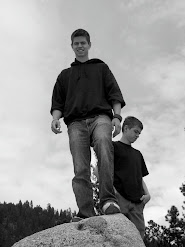
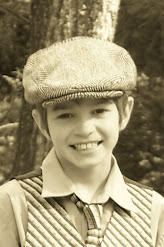
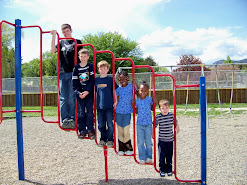

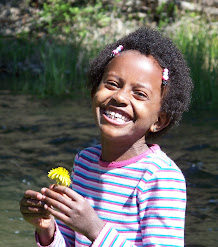
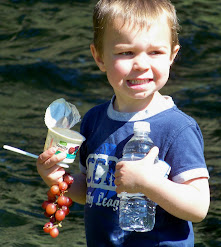




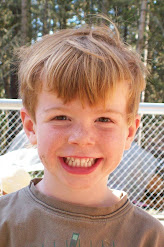





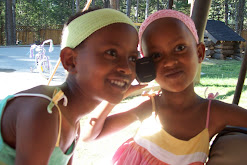





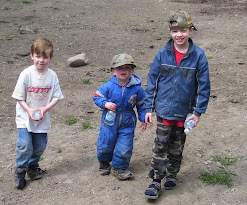



5 comments:
What a great, informative post, Justine!
Thank you very much for it!
I'm glad to hear that you don't "baby" your kids when it comes to food-related fussiness. Too often, parents give in and make separate meals for the fussy kids. I believe this just helps the fussiness grow!
I often find that if I try something and don't like it, and then give it a try again at a later date, I often end up LIKING whatever it is! You just have to give everything an honest chance!
Glad to hear things are going well!
Thanks for the long post. I love reading them and will surely be revisitng them once our daugher comes home.
Thanks for the post! It was nice to "catch up". :)
It is tricky trying to determine what is child and what is adoption related. Thankfully we are finding less adn less adoption related and more and more child underneath it all. I'm sure you agree from the sounds of things. What a great surpise, isn't it?
Shelley in BC
Justine, thanks for answering! (I'd almost forgotten I asked.) I've used some of the same tactics but I think I need to do even more with the talking about (and showing) your feelings. One of my extra challenges is that Big Sister (8.5) wants to get involved and help to fix things and sometimes her intervention is not all that helpful so I end up dealing with two kids instead of just one. (Sometimes it IS helpful but not always.)
I have tried to teach her to remove herself from the situation when she starts to get upset about Little Brother being mad/pouting/ tantruming/ whatever, so that she can calm down (and so I only have to deal with one child, or one at a time) and so HE can have a chance to calm down, too. It is sometimes a challenge.
Things have been better recently, though I wonder sometimes what happens when I'm at work. (And that's another story - I'm starting to look into replacing the nanny who came in Sept as she is not a good fit for us. No authority whatsoever, not good at disciplining or child management, no imagination, doesn't get very involved in playing with the kids (with Button a bit but not much with Mustang - I actually think Nanny is a bit intimidated by Mustang!) and doesn't always keep track of them. NOT a great situation.)
Thanks for that post Justine, it was nice to hear a bit more detail about how things are going. I can relate to many of the issues you have dealt with. I totally agree about the pouting. Selam did that and we were strict and consistant with her that it was not okay to do and now she doesn't. I find it interesting that at the beginning we had to use so many consequences with her and now we don't. She ,for the most part, wants to do the right thing. Just like our other kids. I think your friend was very wise in saying to show your love even when they do bad things. Unconditional parenting. Doing the right thing because it is the right thing to do instead of to avoid punishment. In the book "Attaching in Adoption" she talks about how you have to use so many insentives and consequences at the beginning and it will lessen as your children begin to attach. I have found that to be very true. a child who feels right, acts right - most of the time!
As far as food goes, I totally agree. People cater way too much to their kids and end up feeding them crap just to get something in them. Selam is also picky with vegetables, but I give her a smaller amount and she knows she needs to eat them. I don't know if you have tried raw veggies? Selam likes them better than cooked. I don't think she ever really ate cooked vegetables before. She likes cukes and carrots and peas with shells, but they have to have been out of the fridge for awhile or they are too cold for her!
Thanks for the long email you sent me the other day. I will respond as soon as I can.
take care and give the girls an extra hug from me tonight.
love, Natasha
oh and I would love to hear your thoughts on adopting more than one child at a time. What do you think are the benefits or disadvantages? Any thoughts? you can let me know when you get some spare time! ha ha!
Post a Comment